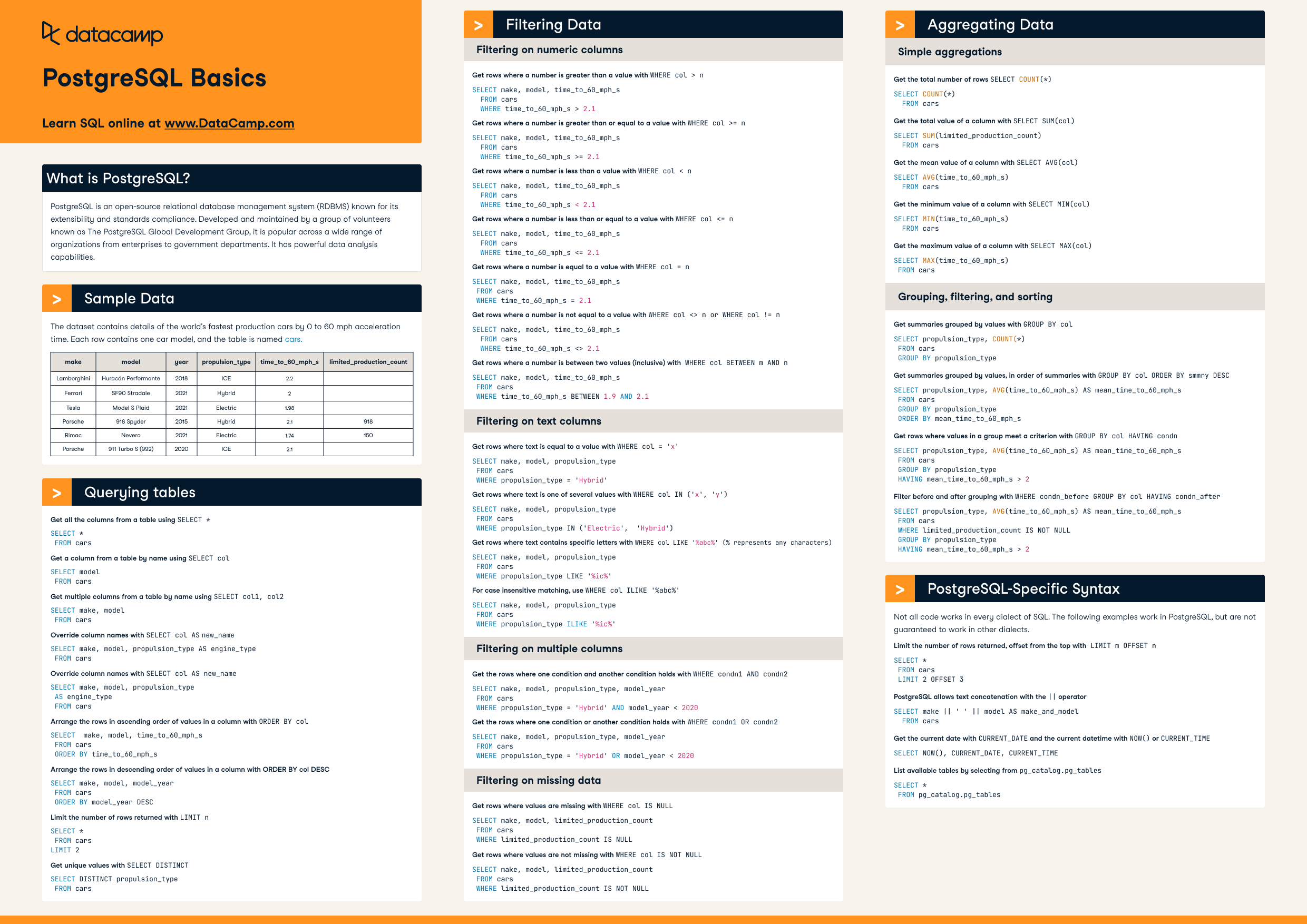
Have this cheat sheet at your fingertips
Download PDFWhat is PostgreSQL?
PostgreSQL is an open-source relational database management system (RDBMS) known for its extensibility and standards compliance. Developed and maintained by a group of volunteers known as The PostgreSQL Global Development Group, it is popular across a wide range of organizations from enterprises to government departments. It has powerful data analysis capabilities.
Sample Data
The dataset contains details of the world's fastest production cars by 0 to 60 mph acceleration time. Each row contains one car model, and the table is named cars.
|
make |
model |
year |
propulsion_type |
time_to_60_mph_s |
limited_production_count |
|
Lamborghini |
Huracán Performante |
2018 |
ICE |
2.2 |
|
|
Ferrari |
SF90 Stradale |
2021 |
Hybrid |
2 |
|
|
Tesla |
Model S Plaid |
2021 |
Electric |
1.98 |
|
|
Porsche |
918 Spyder |
2015 |
Hybrid |
2.1 |
918 |
|
Rimac |
Nevera |
2021 |
Electric |
1.74 |
150 |
|
Porsche |
911 Turbo S (992) |
2020 |
ICE |
2.1 |
Querying tables
Get all the columns from a table using SELECT *
SELECT *
FROM carsGet a column from a table by name using SELECT col
SELECT model
FROM carsGet multiple columns from a table by name using SELECT col1, col2
SELECT make, model
FROM carsOverride column names with SELECT col AS new_name
SELECT make, model, propulsion_type AS engine_type
FROM carsArrange the rows in ascending order of values in a column with ORDER BY col
SELECT make, model, time_to_60_mph_s
FROM cars
ORDER BY time_to_60_mph_sArrange the rows in descending order of values in a column with ORDER BY col DESC
SELECT make, model, model_year
FROM cars
ORDER BY model_year DESC
Limit the number of rows returned with LIMIT n
SELECT *
FROM cars
LIMIT 2Get unique values with SELECT DISTINCT
SELECT DISTINCT propulsion_type
FROM carsFiltering Data
Filtering on numeric columns
Get rows where a number is greater than a value with WHERE col > n
SELECT make, model, time_to_60_mph_s
FROM cars
WHERE time_to_60_mph_s > 2.1
Get rows where a number is greater than or equal to a value with WHERE col >= n
SELECT make, model, time_to_60_mph_s
FROM cars
WHERE time_to_60_mph_s >= 2.1
Get rows where a number is less than a value with WHERE col < n
SELECT make, model, time_to_60_mph_s
FROM cars
WHERE time_to_60_mph_s < 2.1
Get rows where a number is less than or equal to a value with WHERE col <= n
SELECT make, model, time_to_60_mph_s
FROM cars
WHERE time_to_60_mph_s <= 2.1
Get rows where a number is equal to a value with WHERE col = n
SELECT make, model, time_to_60_mph_s
FROM cars
WHERE time_to_60_mph_s = 2.1
Get rows where a number is not equal to a value with WHERE col <> n or WHERE col != n
SELECT make, model, time_to_60_mph_s
FROM cars
WHERE time_to_60_mph_s <> 2.1
Get rows where a number is between two values (inclusive) with WHERE col BETWEEN m AND n
SELECT make, model, time_to_60_mph_s
FROM cars
WHERE time_to_60_mph_s BETWEEN 1.9 AND 2.1Filtering on text columns
Get rows where text is equal to a value with WHERE col = 'x'
SELECT make, model, propulsion_type
FROM cars
WHERE propulsion_type = 'Hybrid'
Get rows where text is one of several values with WHERE col IN ('x', 'y')
SELECT make, model, propulsion_type
FROM cars
WHERE propulsion_type IN ('Electric', 'Hybrid')
Get rows where text contains specific letters with WHERE col LIKE '%abc%' (% represents any characters)
SELECT make, model, propulsion_type
FROM cars
WHERE propulsion_type LIKE '%ic%'
For case insensitive matching, use WHERE col ILIKE '%abc%'
SELECT make, model, propulsion_type
FROM cars
WHERE propulsion_type ILIKE '%ic%'
Filtering on multiple columns
Get the rows where one condition and another condition holds with WHERE condn1 AND condn2
SELECT make, model, propulsion_type, model_year
FROM cars
WHERE propulsion_type = 'Hybrid'
AND model_year < 2020Get the rows where one condition or another condition holds with WHERE condn1 OR condn2
SELECT make, model, propulsion_type, model_year
FROM cars
WHERE propulsion_type = 'Hybrid'
OR model_year < 2020Filtering on missing data
Get rows where values are missing with WHERE col IS NULL
SELECT make, model, limited_production_count
FROM cars
WHERE limited_production_count IS NULL
Get rows where values are not missing with WHERE col IS NOT NULL
SELECT make, model, limited_production_count
FROM cars
WHERE limited_production_count IS NOT NULL
Aggregating Data
Simple aggregations
Get the total number of rows SELECT COUNT(*)
SELECT COUNT(*)
FROM carsGet the total value of a column with SELECT SUM(col)
SELECT SUM(limited_production_count)
FROM carsGet the mean value of a column with SELECT AVG(col)
SELECT AVG(time_to_60_mph_s)
FROM cars
Get the minimum value of a column with SELECT MIN(col)
SELECT MIN(time_to_60_mph_s)
FROM cars
Get the maximum value of a column with SELECT MAX(col)
SELECT MAX(time_to_60_mph_s)
FROM cars
Grouping, filtering, and sorting
Get summaries grouped by values with GROUP BY col
SELECT propulsion_type, COUNT(*)
FROM cars
GROUP BY propulsion_type
Get summaries grouped by values, in order of summaries with GROUP BY col ORDER BY smmry
SELECT propulsion_type, AVG(time_to_60_mph_s) AS mean_time_to_60_mph_s
FROM cars
GROUP BY propulsion_type
ORDER BY mean_time_to_60_mph_s
Get rows where values in a group meet a criterion with GROUP BY col HAVING condn
SELECT propulsion_type, AVG(time_to_60_mph_s) AS mean_time_to_60_mph_s
FROM cars
GROUP BY propulsion_type
HAVING mean_time_to_60_mph_s > 2
Filter before and after grouping with WHERE condn_before GROUP BY col HAVING condn_after
SELECT propulsion_type, AVG(time_to_60_mph_s) AS mean_time_to_60_mph_s
FROM cars
WHERE limited_production_count IS NOT NULL
GROUP BY propulsion_type
HAVING mean_time_to_60_mph_s > 2
PostgreSQL-Specific Syntax
Not all code works in every dialect of SQL. The following examples work in PostgreSQL, but are not guaranteed to work in other dialects.
Limit the number of rows returned, offset from the top with LIMIT m OFFSET n
SELECT *
FROM cars
LIMIT 2 OFFSET 3PostgreSQL allows text concatenation with the || operator
SELECT make || ' ' || model AS make_and_model
FROM carsGet the current date with CURRENT_DATE and the current datetime with NOW() or CURRENT_TIME
SELECT NOW(), CURRENT_DATE, CURRENT_TIMEList available tables by selecting from pg_catalog.pg_tables
SELECT * FROM pg_catalog.pg_tables
Richie helps individuals and organizations get better at using data and AI. He's been a data scientist since before it was called data science, and has written two books and created many DataCamp courses on the subject. He is a host of the DataFramed podcast, and runs DataCamp's webinar program.


